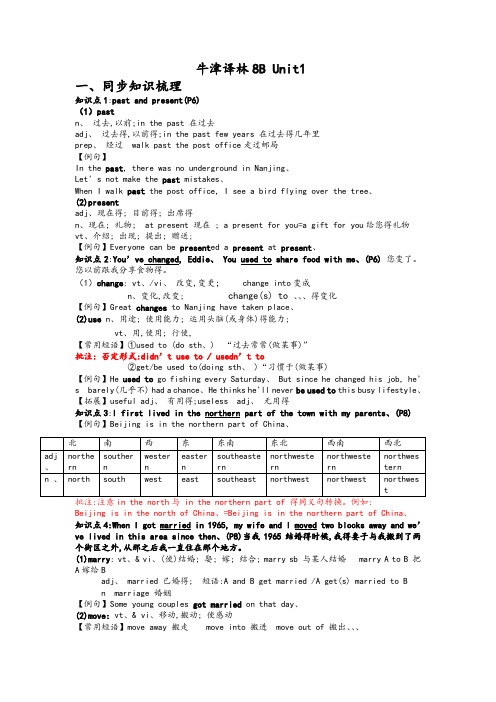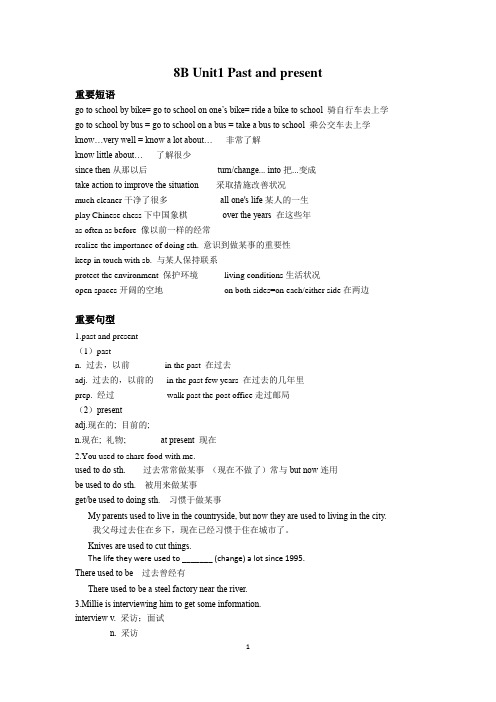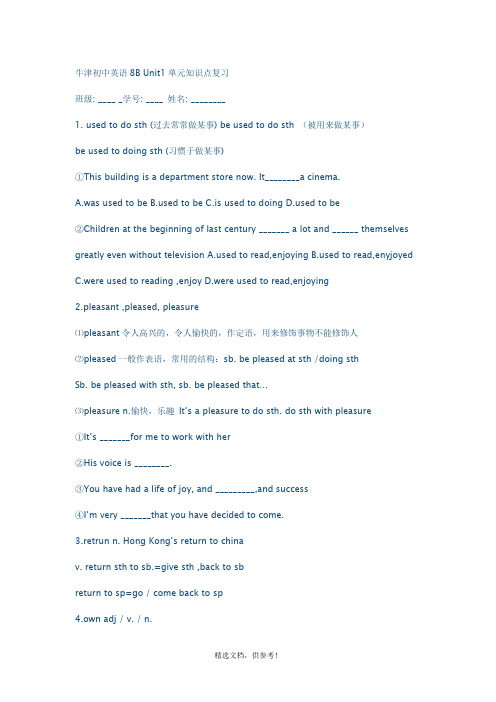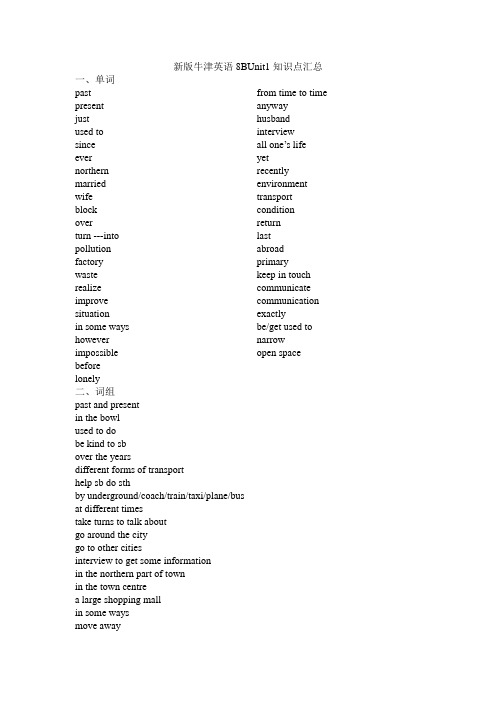牛津英语8Bunit1重点知识归纳(经典)
新版牛津译林8B_Unit1单词词组和语法讲解

牛津译林8B Unit1一、同步知识梳理知识点1:past and present(P6)(1)pastn、过去,以前;in the past 在过去adj、过去得,以前得;in the past few years 在过去得几年里prep、经过 walk past the post office走过邮局【例句】In the past, there was no underground in Nanjing、Let’s not make the past mistakes、When I walk past the post office, I see a bird flying over the tree、(2)presentadj、现在得; 目前得; 出席得n、现在; 礼物; at present 现在 ; a present for you=a gift for you给您得礼物vt、介绍; 出现; 提出; 赠送;【例句】Everyone can be present ed a present at present、知识点2:You’ve changed, Eddie、 You used to share food with me、(P6) 您变了。
您以前跟我分享食物得。
(1)change: vt、/vi、改变,变更; change into变成n、变化,改变; change(s) to 、、、得变化【例句】Great changes to Nanjing have taken place、(2)use n、用途; 使用能力; 运用头脑(或身体)得能力;vt、用,使用; 行使,【常用短语】①used to (do sth、) “过去常常(做某事)”批注: 否定形式:didn’t use to / usedn’t to②get/be used to(doing sth、 )“习惯于(做某事)【例句】He used to go fishing every Saturday、 But since he changed his job, he’s barely(几乎不) had a chance、 He thinks he’ll never be used to this busy lifestyle、【拓展】useful adj、有用得;useless adj、无用得知识点3:I first lived in the northern part of the town with my parents、(P8) 【例句】Beijing is in the northern part of China、Beijing is in the north of China、=Beijing is in the northern part of China、知识点4:When I got married in 1965, my wife and I moved two blocks away and we’ve lived in this area since then、(P8)当我1965结婚得时候,我得妻子与我搬到了两个街区之外,从那之后我一直住在那个地方。
8BUnit1知识点归纳

14. factory a place where things are made by machines 工厂 (factories)
a steel/car factory 一家钢铁/汽车厂 two shoe factories 两家鞋厂
15. waste 废料;废品浪费
The knife is used for cutting apples. be/become/get used to sth习惯于某事, be/become/get used to doing sth习惯于做某事
Tom is used to getting up early. Tom习惯于早起。
The old man isn’t used to the city life. 这个老人不习惯城市生活。
He used to get up late, so he isn’t used to getting up early. 他过去经常起的晚,所以他不习惯早起
The life we were used to has changed a lot. 我们过去习惯了的生活已经改变了许多。
5. since 自…以来
1. past 名词过去 2. In the past 在过去
3. There was a cinema in this area in the past. 4. 过去这儿有一个电影院。 5. In the past two years在过去的两年中(用于完成
时)
6. Great changes have taken place in my hometown in the past two years.
18. situation 形势,情况
英语初中牛津版8bunit1重要知识点归纳

英语初中牛津版8bunit1重要知识点归纳一.【精选词汇】㈠重点短语1.thechangestoSunshineTown阳光镇的变化→thechangesto……的变化(p8) 〈知识链接〉changen.变化,常用复数changes。
e.g.Greatchangeshavetakenplacesince1995.2.inthesouthernpartoftown→inthesouthernpartof…在…的南部→south→southern〈知识链接〉east东部→eastern东部的,west→western,north→northern 3.inthepast在过去→atpresent现在→inthefuture以后;今后,注意这些短语中的介词和冠词。
4.turntheplaceintoapark→turn…into…把…变成…〈知识链接〉①Heatturnswaterintovapor.热使水变成蒸气。
②TurnthissentenceintoEnglish.5.playcardsandChinesechess打牌、下象棋, e.g.It’spleasanttoplaycardsandChinesechess.6.waterpollution水污染→airpollution空气污染,noisepollution噪音污染(p9)〈知识链接〉Waterpollutionwasaproblembefore.edtodumpitswasteintowater→usedtodosth过去常做某事,注意否定式、疑问式的形式〈知识链接〉⑴usedtodosth→否定式usednottodosth或didn’tusetodosth→疑问式Didsbusetodosth?或Usedsbtodosth?⑵Therebe和usedto合用的形式为Thereusedtobe。
依照要求进行句型转换:Sheusedtoteachhistory.①否定式:Sheusedteachhistory.或Shedidn’tteachhistory.②疑问式:sheteachhistory?或Didsheteachhistory?〈用法拓展〉⑴beusedtodosth=beusedfordoingsth被用于做某事,e.g.Stampsareusedtosendletters.=Stampsareusedforsendingletters.⑵be/become/getusedtosth适应于某事,be/become/getusedtodoingsth适应于做某事, e.g.①Mygrandmausedtoliveinthecitybutnowshehasgotusedtothecountrylife.②Tomisusedtogettingupearly.8.insomeways在某种程度上;在某些方面→inthisway以这种方式9.feelabitlonelyfromtimetotime→fromtimetotime=attimes=sometimes有时;不时地〈知识链接〉⑴abit+形容词原级或比较级=alittle+形容词原级或比较级,有点…⑵abitof+不可数名词=alittle+不可数名词 e.g.abitofwater=alittlewater〈用法拓展〉notalittle=very特别,notabit=not…atall一点也不10.throwaway扔掉…→“动词+副词”结构,e.g.throwit/themaway11.haveaninterviewwithsb=interviewsb采访某人;对某人面试;与某人面谈(p12)〈知识链接〉①Myparentshavehadaninterviewwithmyteacher.②Theyinterviewed20peopleforthejob.③Thereareanumberofinterviewswithsomefamousfootballplayers.12.thebestmodelIhaveeverseen我曾见过的最好的模型(p17)〈知识链接〉the+形容词最高级+名词单数+sbhave/haseverdone,某人曾做过的最…的…themostwonderfulfilm(that)hehaseverwatched他看过的最精彩的竞赛〈用法拓展〉⑴ever通常用于疑问句中或否定句中。
牛津英语8B Unit1重点知识总结

8B Unit1 Past and present重要短语go to school by bike= go to school on one’s bike= ride a bike to school 骑自行车去上学go to school by bus = go to school on a bus = take a bus to school 乘公交车去上学know…very well = know a lot about… 非常了解know little about… 了解很少since then从那以后turn/change... into把...变成take action to improve the situation 采取措施改善状况much cleaner干净了很多all one's life某人的一生play Chinese chess下中国象棋over the years 在这些年as often as before 像以前一样的经常realize the importance of doing sth. 意识到做某事的重要性keep in touch with sb. 与某人保持联系protect the environment 保护环境living conditions生活状况open spaces开阔的空地on both sides=on each/either side在两边重要句型1.past and present(1)pastn. 过去,以前in the past 在过去adj. 过去的,以前的in the past few years 在过去的几年里prep. 经过walk past the post office走过邮局(2)presentadj.现在的; 目前的;n.现在; 礼物; at present 现在2.You used to share food with me.used to do sth. 过去常常做某事(现在不做了)常与but now连用be used to do sth. 被用来做某事get/be used to doing sth. 习惯于做某事My parents used to live in the countryside, but now they are used to living in the city.我父母过去住在乡下,现在已经习惯于住在城市了。
牛津初中英语8B Unit1单元知识点复习

牛津初中英语8B Unit1单元知识点复习班级: ____ _学号: ____ 姓名: ________1. used to do sth (过去常常做某事) be used to do sth (被用来做某事)be used to doing sth (习惯于做某事)①This building is a department store now. It________a cinema.A.was used to beed to beC.is used to doinged to be②Children at the beginning of last century _______ a lot and ______ themselves greatly even without television ed to read,enjoying ed to read,enyjoyedC.were used to reading ,enjoyD.were used to read,enjoying2.pleasant ,pleased, pleasure⑴pleasant令人高兴的,令人愉快的,作定语,用来修饰事物不能修饰人⑵pleased一般作表语,常用的结构:sb. be pleased at sth /doing sthSb. be pleased with sth, sb. be pleased that…⑶pleasure n.愉快,乐趣It’s a pleasure to do sth. do sth with pleasure①It’s _______for me to work with her②His voice is ________.③You have had a life of joy, and _________,and success④I’m very _______that you have decided to come.3.retrun n. Hong Kong’s return to chinav. return sth to sb.=give sth ,back to sbreturn to sp=go / come back to sp4.own adj / v. / n.①This is /his _______house (自已的)=This house is his________②他父亲有一面大镜子。
牛津译林八年级下册8BUnit1 知识梳理

牛津译林八年级下册8BUnit1 知识梳理一、重点词汇:1. 时态标志词:一般现在时:from time to time=at times一般过去时:in the past现在进行时:at present现在完成时:in/during/over the past/last XX years / just /since /ever /over the years before (在句末,副词) yet recently重要考点:1) already, yet, just区别already, just只能用于肯定句,yet用于否定句和疑问句just只能放在have和done中间,already可以放在have和done中间或句末,yet只能放在句末。
2) since和for的区别,since的用法since+过去时间点;since+时间段 ago;since+从句(一般过去时) ;since doingIt is 时间段 since+从句for+时间段(注意时态未必是完成时,要看有没有持续到现在)3) just和just now的区别:just是现完标志词,just now是过去时4) ever表示的曾经不同于once,是现完标志词,一般用于疑问句,位置在done前面ever句型:It is the 最高级 sth that I have ever done5) before做副词才是现完标志词,做连词不是。
2. used to用法:(1) 句型:过去常常做used to do 过去有 there used to be 过去是 used to be(2) 同义:used to=once(3) 否定形式:usedn’t to didn’t use to(4) 辨析:be used to doing 习惯于做某事 be used to do 被用来做某事3. northern:在中国北部:in the north of China=in the northern part of China4. married:(1) 注意介词:get married to sb.(2) 持续性动词:be married to(3) 变形:marry vt. marry sb. marriage n. (了解)5. in some ways 在某种程度上way的短语:in this way 用这种方法 on the way to 在去某地的路上 in one’s way 挡了某人的道by the way 顺便说一下6. interview vt. 采访,面试 n. 采访,面试考点:区分动词,名词:have interviewed sb. have interviews with sb.7. return vi. 返回 vt. 归还return to return from 不与back共用return sth. to sb.8. abroad adv. 在国外go abroad 持续性动词be abroad 前面不加介词9. exactly adv. 正是,没错考查变形:exact-exactly考查中文提示:正是如此,确切地考查情景交际。
新版牛津英语8BUnit1知识点汇总

新版牛津英语8BUnit1知识点汇总一、单词past presentjustused to sinceever northern marriedwifeblockoverturn ---into pollution factory waste realize improve situationin some ways however impossible from time to time anyway husband interviewall one’s lifeyetrecently environment transport conditionreturnlastabroadprimarykeep in touch communicate communication exactlybe/get used to narrowopen spacebeforelonely二、词组past and presentin the bowlused to dobe kind to sbover the yearsdifferent forms of transporthelp sb do sthby underground/coach/train/taxi/plane/bus at different timestake turns to talk aboutgo around the citygo to other citiesinterview to get some informationin the northern part of townin the town centrea large shopping mallin some waysmove awaythe meaning of the wordsbecause of being alonea group of buildings with streets on all sidesthe history of Sunshine Townall his lifeon my ownnarrow and dirty roadsgreen trees on both sidesenjoy a comfortable lifein some large open spaceshave their own cars三、句型1.It was in the bowl an hour ago.2.Have you seen my food?3.I’ve just eaten it.4.You have changed. You used to share my food with me.5.You used to be so kind to me.6.How did you go to school when you were a student?7.Why didn’t you take a bus?8.There were too many people on the bus, and it took a long time to wait for thenext one.9.Times have changed.10.I have lived there since I was born.11.Have you ever moved house?12.When I got married in 1965, my wife and I moved to two blocks away and we’velived in this area since then.13.Has the town changed a lot over the years?14.The government has turned part of the town centre into a new park.15.Was pollution a problem then?16.There was once a steel factory near the Sunshine River.17.They often put the waste into the river.ter the government realized the problem and took action to improve thesituation.19.Now the river is much clearer.20.Do you think life is better now?21.It’s really nice to have a beautiful modern town.22.It has become impossible for us to see each other as often as before.23.We used to play cards and Chinese chess together.24.Now I feel a bit lonely from time to time.25.Anyway, it’s good to see the amazing changes in the town.26.Tell me about your interview with Mr Chen. `27.What was the town like in the past?28.Have you seen any films recently?29.It’s about the changes in Beijing over the past century.30.Mr Li has repaired over ten bicycles since Monday.31.Do you plan to see it again?32.She went abroad with her parents.33.You were still primary school then.34.We mainly communicate by email.35.The Internet makes communication much easier.36.The new shopping mall is a good place to have fun.37.A river runs through the centre of town.38.It is not easy to get used to the changes of life quickly.39.I have to spend more time on my homework than before.40.Many changes have taken place in Moonlight Town over the years.四、语法(现在完成时)1、基本机构主语+have/has done sth2、动词变化规则+ed finshed+d changed-y+ied carried双写+ed stopped不变come-come hurt-hurthold-held win-wonlend-lent build-builtcatch-caught keep-kept forget-forgotten tell-toldbe-been have-had fall-fallen fly-flown draw-drawn see-seenmake-made hit-hit put-put meet-met make-made sell-sold give-given write-written think-thought visit-visited live-lived repair-repaired move-moved try-tried study-studied fit-fitted plan-planned。
(完整word版)新版牛津译林8B_Unit1单词词组和语法讲解

牛津译林8B Unit1一、同步知识梳理知识点1:past and present(P6)(1)pastn. 过去,以前;in the past 在过去adj. 过去的,以前的;in the past few years 在过去的几年里prep. 经过 walk past the post office走过邮局【例句】In the past, there was no underground in Nanjing。
Let’s not make the past mistakes.When I walk past the post office, I see a bird flying over the tree.(2)presentadj。
现在的;目前的;出席的n。
现在; 礼物; at present 现在 ; a present for you=a gift for you给你的礼物vt。
介绍;出现; 提出;赠送;【例句】Everyone can be present ed a present at present。
知识点2:You’ve changed, Eddie. You used to share food with me。
(P6) 你变了。
你以前跟我分享食物的。
(1)change: vt./vi. 改变,变更; change into变成n.变化,改变;change(s) to ..。
的变化【例句】Great changes to Nanjing have taken place.(2)use n。
用途; 使用能力; 运用头脑(或身体)的能力;vt。
用,使用; 行使,【常用短语】①used to (do sth.) “过去常常(做某事)"批注: 否定形式:didn’t use to / usedn't to②get/be used to(doing sth. )“习惯于(做某事)【例句】He used to go fishing every Saturday。
- 1、下载文档前请自行甄别文档内容的完整性,平台不提供额外的编辑、内容补充、找答案等附加服务。
- 2、"仅部分预览"的文档,不可在线预览部分如存在完整性等问题,可反馈申请退款(可完整预览的文档不适用该条件!)。
- 3、如文档侵犯您的权益,请联系客服反馈,我们会尽快为您处理(人工客服工作时间:9:00-18:30)。
8B Unit 1一.精选词汇㈠重点短语1. the changes to Sunshine Town阳光镇的变化→the changes to……的变化 (p8)〈知识链接〉change n.变化,常用复数changes。
e.g. Great changes have taken placesince 1995.2. in the southern part of town →in the southern part of…在…的南部→south →southern〈知识链接〉east东部→eastern东部的, west →western, north →northern3. in the past在过去→at present现在→in the future未来;将来,注意这些短语中的介词和冠词。
4. turn the place into a park →turn…into…把…变成…〈知识链接〉①Heat turns water into vapor.热使水变成蒸气。
②Turn this sentence into English.5. play cards and Chinese chess打牌、下象棋,e.g. It’s pleasant to play cards andChinese chess.6. water pollution水污染→air pollution空气污染,noise pollution噪音污染 (p9)〈知识链接〉Water pollution was a problem before.7. used to dump its waste into water →used to do sth过去常做某事,注意否定式、疑问式的形式〈知识链接〉⑴used to do sth →否定式used not to do sth或didn’t use to do sth→疑问式Did sb use to do sth?或Used sb to do sth? ⑵There be和used to合用的形式为There used to be。
根据要求进行句型转换:She used to teach history. ①否定式:She used teach history.或She didn’t teach history. ②疑问式: she teach history?或Did she teach history?〈用法拓展〉⑴be used to do sth=be used for doing sth被用于做某事,e.g. Stamps areused to send letters.=Stamps are used for sending letters. ⑵be/become/get used tosth习惯于某事,be/become/get used to doing sth习惯于做某事,e.g. ①My grandma usedto live in the city but now she has got used to the country life. ②Tom is used togetting up early.8. in some ways在某种程度上;在某些方面→in this way以这种方式9. feel a bit lonely from time to time →from time to time=at times=sometimes有时;不时地〈知识链接〉⑴a bit+形容词原级或比较级=a little+形容词原级或比较级,有点…⑵a bit of+不可数名词=a little+不可数名词 e.g. a bit of water=alittle water〈用法拓展〉not a little=very非常,not a bit=not…at all一点也不10. throw away扔掉…→“动词+副词”结构,e.g. throw it/them away11. have an interview with sb=interview sb采访某人;对某人面试;与某人面谈 (p12)〈知识链接〉①My parents have had an interview with my teacher. ②They interviewed20 people for the job. ③There are a number of interviews with some famous football players.12. the best model I have ever seen 我曾见过的最好的模型 (p17)〈知识链接〉the+形容词最高级+名词单数+sb have/has ever done,某人曾做过的最…的…the most wonderful film (that) he has ever watched他看过的最精彩的比赛〈用法拓展〉⑴ever通常用于疑问句中或否定句中。
e.g. ①Have/Has sb ever done sth?②Nobody ever stepped in this cavern.没人曾经踏进过这洞穴。
⑵ever since…自从…起到现在(用于现在完成时),for ever=forever永远;永久地13. move into the new flats→move into…搬进…,move out of…搬出… (p18)14. lend me a book→lend sb sth=lend sth to sb把某物借给某人,是“借出”。
〈知识链接〉borrow sth from sb向某人借某物,是“借入”。
15. a recent photo一张近期照片,write about the changes to Moonlight Town (p21)16. a tourist attraction旅游胜地→attraction n. 吸引;向往的地方→attract vt.吸引→attractive有吸引力的①It has become a new tourist attraction. ②Hepburn’s beauty and charm attracted Colette’s attention.㈡词汇解析1. 常见的交通工具:bike/bicycle, bus, double-decker双层巴士, coach长途汽车, tram 有轨电车, taxi, train, underground, light rail轻轨, plane, hot-air balloon热气球, aero done滑翔机2. Using a dictionary: The words in a dictionary are in alphabetical order from “A”to “Z”. This helps us find the words we want quickly. If two words starts with the same letter, we look at the second letter to decide the alphabetical order. If the first two letters of two words are the same, we look at the third letter, and so on.e.g. The word “ball” comes before the word “banana”.3. century=one hundred years世纪;百年。
⑴某世纪用序数词。
如:21世纪the twenty-first century。
⑵“在某世纪”用介词in,如:in the 20th century在20世纪。
二. 重点句型1. —Eddie, have you seen my food? —Yes, I’ve just eaten it. (p6)2. You’ve changed, Eddie. You were kind. Now you’re not. I don’t want to play with you any more.3. You’ve changed too. You always wanted to play with me. →always+过去式=used to do sth4. Coaches have been in use/service in Beijing since 1958. →have been in use=have been used5. I moved here with my family when I was two years old and have lived here since then. (p8)6. Have you ever moved house? →move house搬家7. We lived till 1965, when I got married. →get married结婚→get/be married to sb 与某人结婚〈知识链接〉⑴marry sb与某人结婚,e.g. She married a football player. ⑵marry sb to sb把某人嫁给某人,e.g. He married his daughter to an actor. ⑶get/be married to sb和某人结婚,e.g. Yao Ming got married to Ye Li on 6 August, 2007. ⑷表示“已经结婚”用have/has got married,表示“已经结婚多久”用have/has been married for+时间段或since+时间点。
e.g. ①They have got married. ②They have been married for 5 years.不能说成They have got married for 5 years.〈用法拓展〉marriage n.婚姻e.g. They will celebrate their fifty years of marriagenext month.8. Has Sunshine Town changed a lot over the years? →change a lot变化大〈知识链接〉over the years=in the last/past years这些年来,这是现在完成时的一个标志。
